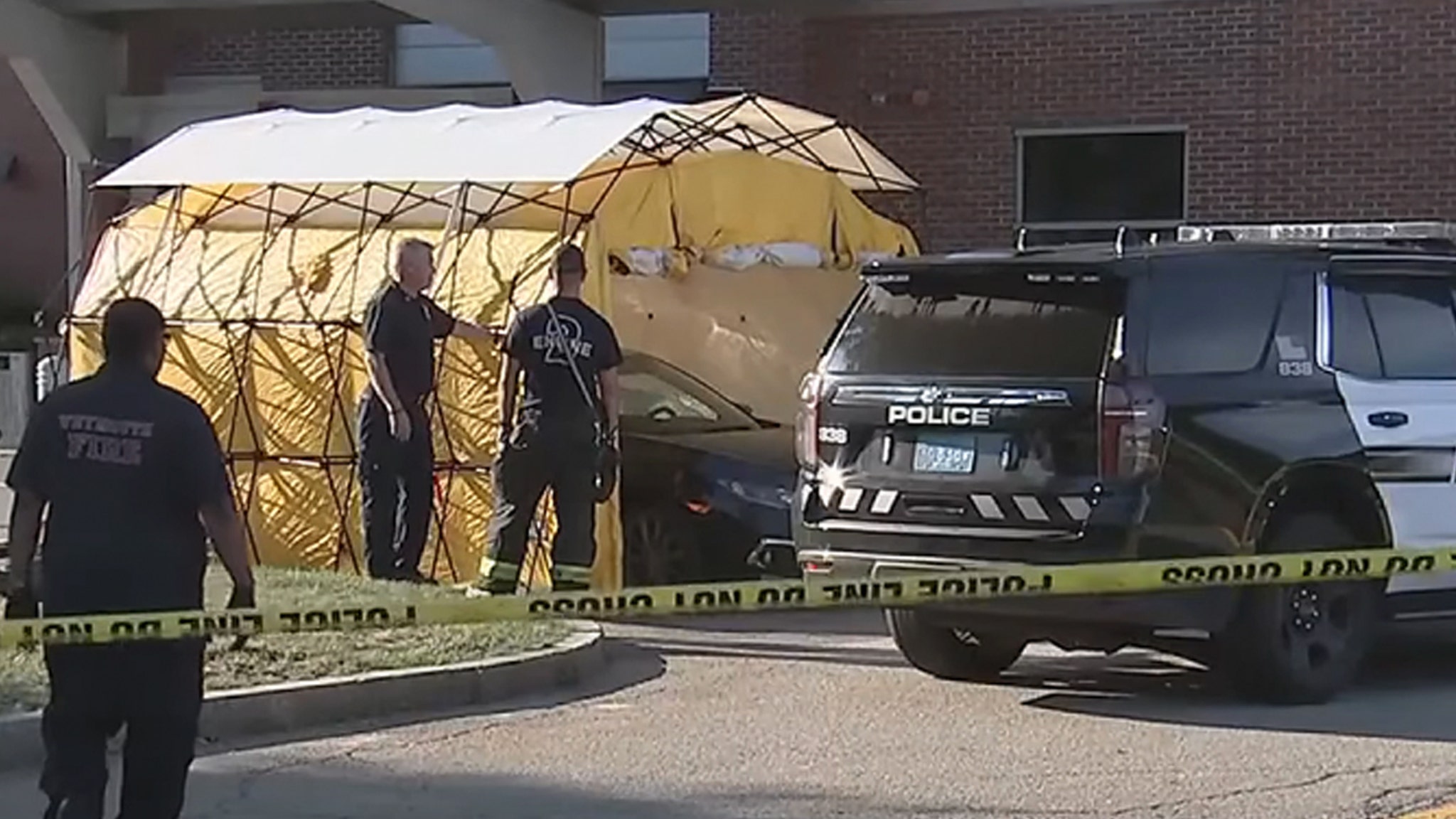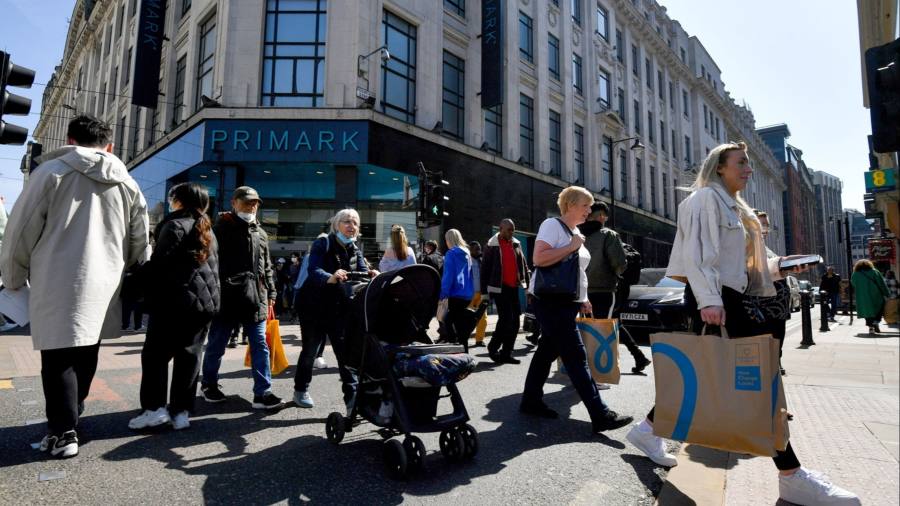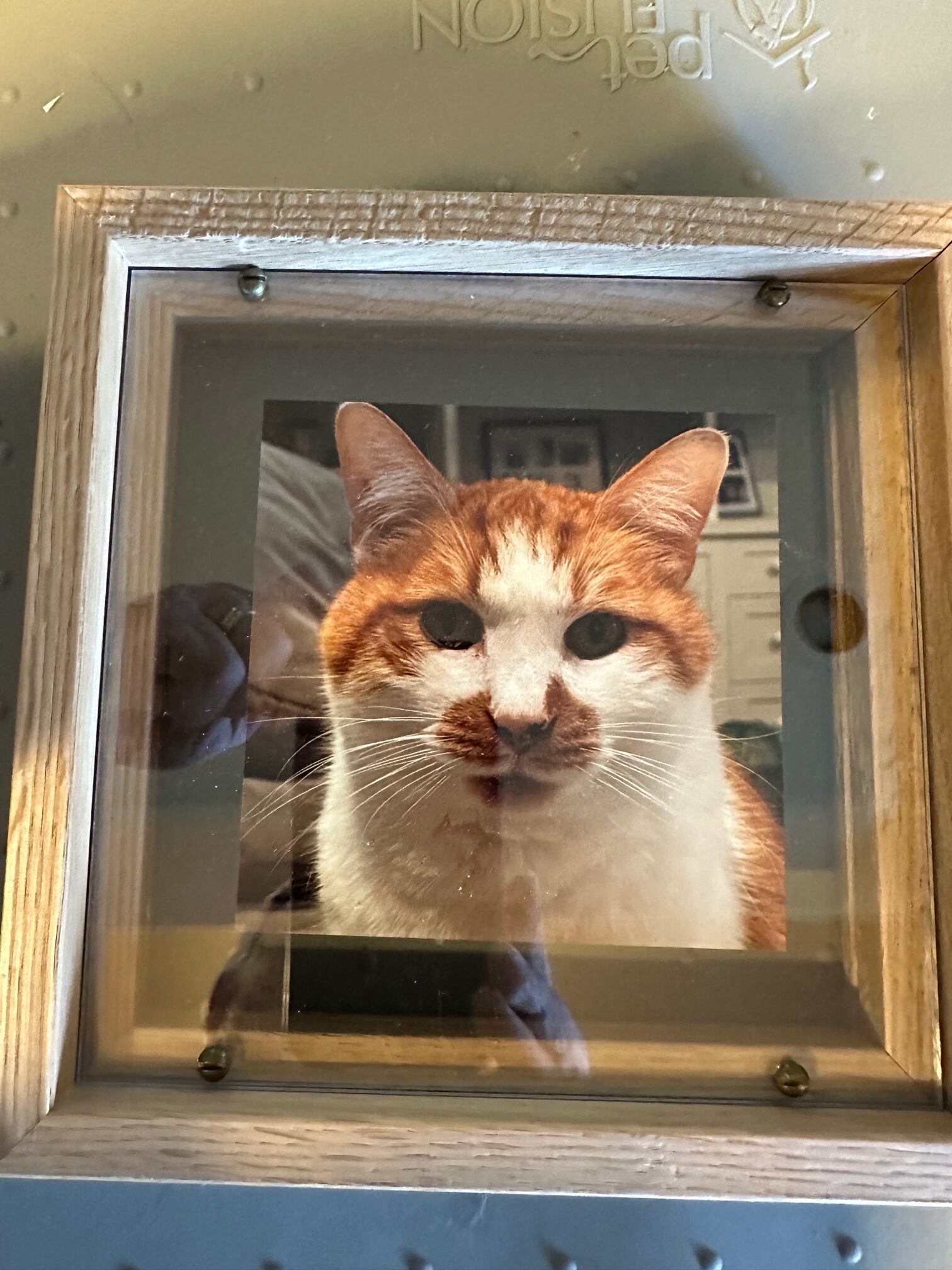The best TV scenes of 2022 were complex, profound, and anchored by some of the greatest small-screen performances in recent memory.
This article is part of our 2022 Rewind. Follow along as we explore the best and most interesting movies, shows, performances, and more from this very strange year. In this entry, TV Critic Valerie Ettenhofer walks you through the 15 best TV scenes of 2022.
Sometimes you have to look closely to see the big picture. When I was putting together our list of the best 15 TV shows of 2022, I couldn’t for the life of me figure out what any of this year’s greatest shows had in common. The shows on that list and this one are wide-ranging: comedies, dramas, fantasies, and thrillers. They have little in common, I figured, besides existing during a precarious time for the medium, in which streamers are oversaturated even as they struggle to cut costs in ways that don’t leave them looking like mustache-twirling villains.
When it came time to pick this year’s best scenes, though, I realized something else: TV is beautifully complicated. Many of the scenes here can’t be summed up in an elevator pitch or even in a tidy paragraph. They don’t spoon-feed us meaning, instead choosing to reveal subtle and sometimes conflicting truths about the characters and worlds of each respective show. They make bold statements about sacrifice, longing, agency, and love. And they’re anchored by some of the best working actors of our age, from John Turturro to Bob Odenkirk, Lily Gladstone to Danielle Deadwyler.
This may be the year that the sheer amount of TV available truly became too much to manage, but for all our sakes, I hope it wasn’t the year we tuned out. The small screen was full of brilliant, showstopping moments this year, including the fifteen that follow.
15. Breaking the Hot Pink Fourth Wall
Show: Angelyne
Episode: “Pink Clouds”
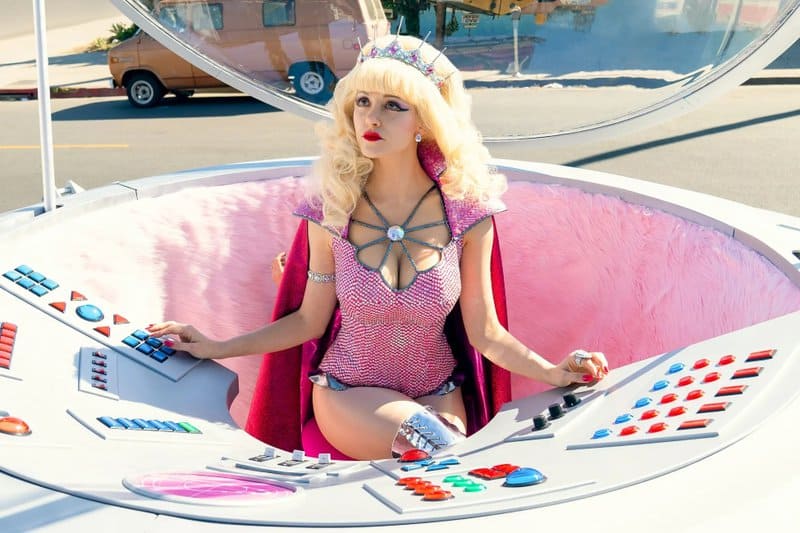
Peacock’s Angelyne series is a candy-coated nesting doll of artifice, an examination of a real-life figure who worked tirelessly to cultivate an enigmatic and sometimes confounding self-image. Emmy Rossum plays the LA legend, whose famous-for-being-famous schtick came decades before the Kardashians hit the scene. But as the series tells it, Angelyne herself is a bit of a puzzle, almost pathologically evasive about her background in service of the Barbie-doll image she constructed for herself.
The last scene of Angelyne doesn’t bother to untangle the web of real and fake Angelynes, instead letting them collide in a sparkly pink fever dream. After sharing what could be the true backstory of the girl who would become Angelyne, the series signs off with a cheeky reference to the unknowable — and image-savvy — nature of its protagonist. The pre-Angelyne girl hides from her life in a closet, which soon becomes soaked in a warm magenta light. She breaks through the wood to discover a ladder that takes her to a pink planet, where she meets her future self in a spaceship control room.
As Angelyne is born and crash lands on earth, the talking heads from the series — including an older version of her — try their best to wrap up this strange saga. “I’m gonna write my own story,” Emmy-as-older-Anglyne says. “This isn’t it.” Then the newly-born younger Angelyne comes down from the sky in her fuzzy pink spaceship and delivers one last monologue. “I’m for real! Oooh!” she coos before looking up to the sky. Suddenly, the illusion shatters. “How was that?” Emmy Rossum quips in her own New York accent. “Hello? Hello?” In a super-clever meta moment, it’s Rossum as herself, speaking to the real Angelyne offscreen. But the control room is empty now, and the mystery lives on.
14. A Fervent Confession
Show: Bridgerton
Episode: “An Unthinkable Fate”
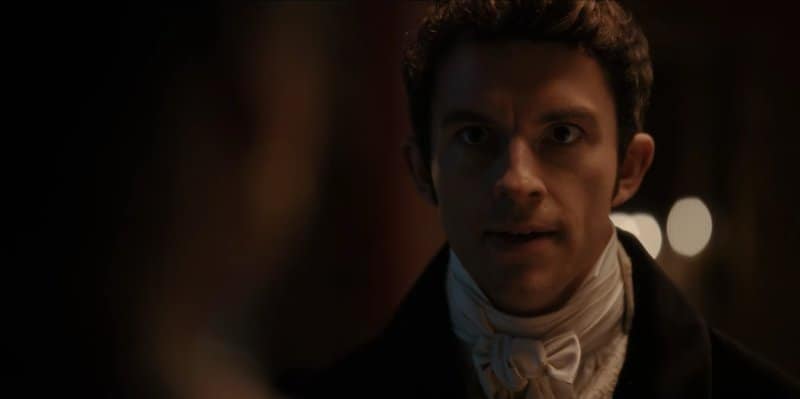
While the first season of Netflix’s steamy romance Bridgerton combined Regency-era domestic drama with lots of hot sex, its second installment took a more restrained, Austenian approach to its central couple. The resulting storyline, between spinster Kate Sharma (Simone Ashley) and Anthony Bridgerton (Jonathan Bailey), who is promised to her sister, may technically be more chaste, but it still delivers plenty of fireworks.
The pair’s vexing, often outright antagonistic relationship comes to a head when Anthony storms out of a particularly dramatic dinner. When Kate follows him to a drawing room, reminding him that she’s leaving for India, he erupts at her, confessing that his honor hangs by a thread. “Do you think that there is a corner of this earth that you could travel to far away enough to free me from this torment?” Anthony spits. But his venom quickly melts, and he confesses everything in a singly swoon-worthy line, telling Kate: “You are the bane of my existence and the object of all my desires.” The two don’t even share a kiss here, instead pulling apart after Anthony’s brief whispers about seduction, but it’s still one of the most romantic – and hottest – moments on TV this year.
13. The Bright Side
Show: Better Things
Episode: “We Are Not Alone”
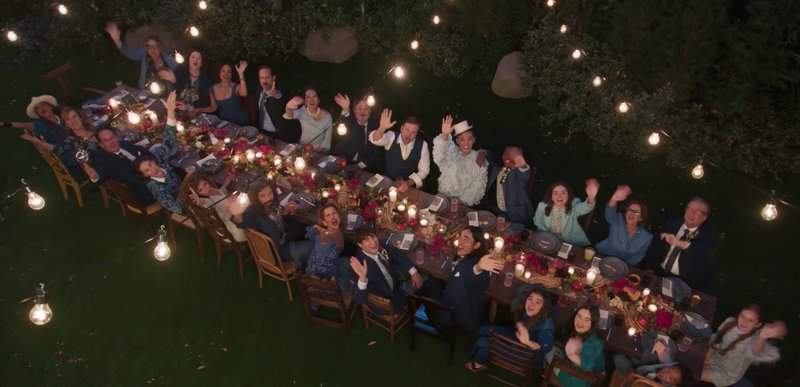
Every once in a while, a show is so lovable that reaching the last moments of its finale can feel a little bit like having a panic attack. We’re not ready to say goodbye, and we don’t know who we’ll be or how we’ll be when this piece of art is gone for good. Luckily, the last season of Pamela Adlon’s Better Things was all about meeting change with grace and joy, and Adlon – and her on-screen alter ego, mom and actor Sam Fox – knew exactly what we needed to make it through.
The show’s series finale winds down with Sam at what could be a moment of terrifying transition; her eldest daughter and elderly mother have moved to England, while her two youngest are growing up faster than she can blink. Yet she faces the new day with a drive towards the starry horizon, and while she soaks up the LA night, the show’s cast takes a bow.
The Monty Python song “Always Look on the Bright Side of Life” inexplicably begins to play, and cast members past and present break into song and dance in a scene that overflows with the same everyday magic that made the series great. Sam’s kids, friends, and doctor all implore us to “laugh and smile and dance and sing,” along with Danny Trejo (as himself), drag queens at Hollywood Forever cemetery, and a child version of Sam herself. It’s impossible not to smile through tears as the cast sings their way out, stopping to shout a simple message that comes through loud and clear to all the viewers at home: “We love you!” We love you too, Better Things.
12. Two Heartbeats
Show: Interview with the Vampire
Episode: “In Throes of Increasing Wonder…”
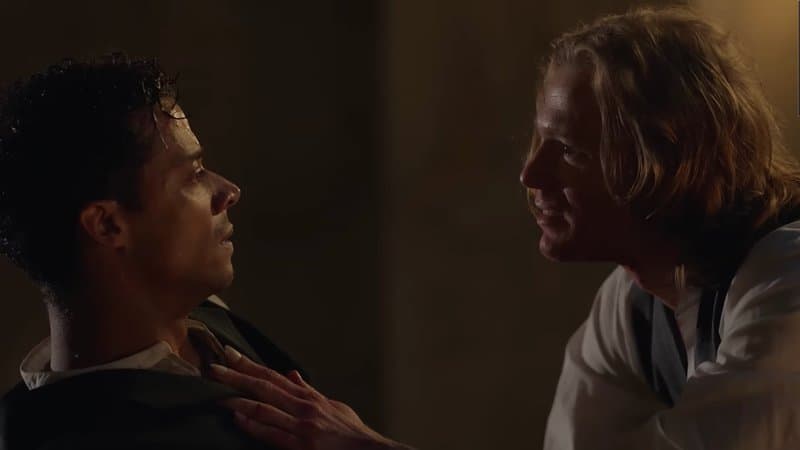
Interview with the Vampire starts off with a bang. That bang, specifically, is the sound of a rattling confessional booth as the vampire Lestat (Sam Reid) rips the priest his human paramour Louis (Jacob Anderson) has been confessing to out of it, flinging him across a church floor to feast on his blood. That’s not even the most sacrilegious thing that happens in the climax of Interview with the Vampire’s astoundingly self-assured pilot episode. No, that would be Louis punching a second priest straight through his skull before coercing his new life mate into letting Lestat turn him into a vampire with God as their witness.
Anne Rice’s Vampire Chronicles series is as off-the-wall as it is influential, and the stellar AMC adaptation hits all the right notes as it balances its classic love-hate story with delicious melodrama. The scene itself embodies all of the show’s facets, beginning with a brilliant performance from Anderson confessing all his sins as a grieving, ashamed gay Black brothel owner living in the early 1900s. “I laid down with a man,” he admits at the end of his fraught confession. “I laid down with the devil, and he has his roots in me.” He sure does. By the glow of destructive firelight, blood-soaked Lestat dispatches the priests, then convinces Louis he’s the love of his life. Reid flits from frightening to seductive to arrogant and back again as Rice’s Brat Prince personified. By the time their two hearts beat as one — before Louis’ slows altogether — Interview with the Vampire has made the best first impression of any show this year.
11. A Song For The People
Show: Pachinko
Episode: “Chapter Four”
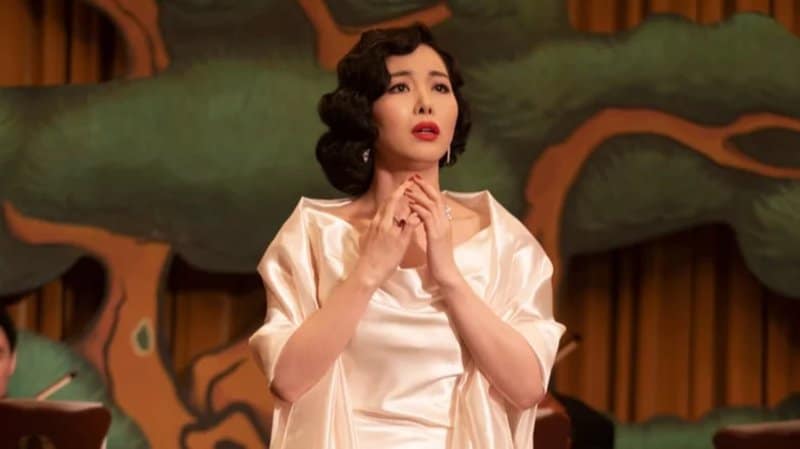
The Justin Chon-directed fourth episode of Pachinko continued the series’ ongoing story of a Korean-Japanese family, tying several generations together with one powerful crescendo. At the episode’s end, one sequence cross-edits two plots, both of which hinge on the saga of young Sunja (Kim Min-ha), now pregnant and trapped in steerage on a ship bound for Japan (which occupied her home country of Korea at the time). Before she boarded, Sunja encountered an ornately dressed Korean singer (Lee Ji-hye), a celebrity of sorts who promises to sing a song for her that night.
It’s only when Sunja is in the midst of misery below deck that we realize what the singer, now performing upstairs, meant. Even though the superstar is in a gilded cage, trapped under the thumb of a group of Japanese men, she can still stand up for a better future for her fellow countrymen — in a painful way. As she begins to sing for her audience, the singer’s voice suddenly changes. Instead of a Japanese song, she belts out a Korean one, shot through with emotion and loud enough for the Korean immigrants below deck to hear her.
Then, before someone else can, she slits her own throat. It’s a shocking moment in which inspiration turns to tragedy, one that reverberates through the decades. At the same time, in the 1980s, Sunja’s businessman son (Soji Aria) decides at the last minute not to let one of his elders sign away her legacy in a deal that would leave him set for life. They’re twin moments of solidarity, sacrifice, and honor, delivered with sincerity and grace. To cap it all off, we see now-elderly Sunja (Youn Yuh-jung) back in Korea for the first time in decades, overcome with emotion as she stands beside the sea she once crossed.
10. Rue’s Relapse
Show: Euphoria
Episode: “Stand Still Like a Hummingbird”
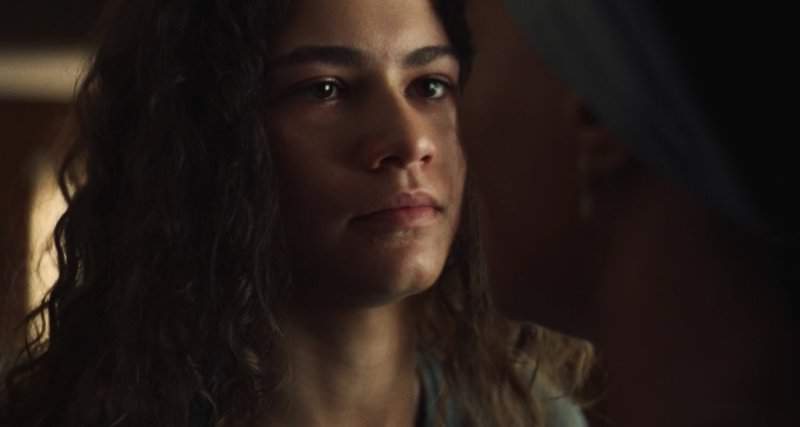
To call the 17-minute-long cold open to Euphoria’s relapse episode a single scene is a bit like calling the entire seventh episode of The Bear a single scene (spoiler alert: we didn’t, though it’s great), but it technically fits the bill. In a sophomore season that included stylistic highs (see: the Fezco cold open) and narrative lows (see: Kat’s disappearing plot), nothing packed more of a punch than this brutally raw, game-changing sequence in which Rue (Zendaya) goes through every stage of grief when faced with an intervention from her family.
The scene that begins with Rue finding out her drugs have been flushed isn’t just compelling; it’s so tense that it’s hard to catch a breath while watching. Rue, who we know is a nice but troubled girl, acts with the rage of a person possessed, spewing insults at her mother (Nika King) and sister (Storm Reid), breaking her girlfriend Jules’ (Hunter Schaffer) heart with terrifying surgical precision, and devolving into a scared, sad little girl who just wants it all to go away. Sam Levinson, whose direction is typically as stylized as is humanly possible, here captures Zendaya straight on with a stripped-down, vulnerable gaze. The roaring, world-ending fury of addiction has rarely ever looked so real on screen.
9. I Can’t Swim
Show: Andor
Episode: “One Way Out”
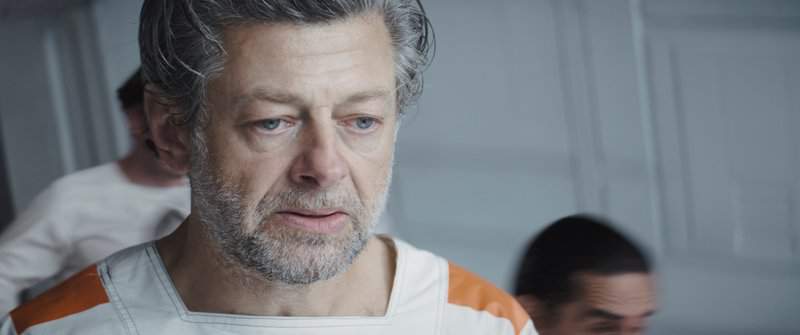
Inside the deadly prison where Cassian Andor (Diego Luna) and Kino Loy (Andy Serkis) plot their escape, this episode of Andor feels like one long scene. The tension-soaked hour starts with the prisoners learning that their fellow inmates have been killed in an incident that’s sure to be covered up and ends with Stellan Skarsgard’s Luthen Rael talking about the heavy weight of sacrifice, but in the middle, it’s all on Kino to get these men out.
The initially pessimistic shift manager ends up rallying his fellow men with a speech, hijacking an intercom system to tell them the electric-floor security system has been disabled. “Wherever you are right now, get up, stop the work,” he says, inciting a mass escape. He lists the corruptions, crimes, and indignities that are part and parcel of the prison, and in a testament to Andor’s rallyingly anti-fascist sentiment, they sound more than a little bit like some real-life criminal justice systems. “There is one way out,” he says, with tears brimming in his eyes.
Only, the way out doesn’t turn out to be one Kino can take himself. As the prisoners reach their exit point, they must leap into the ocean to be free, and Kino stops as they rush past him. “I can’t swim,” he says simply, and Andor is pushed out before he hears any more. It’s a brilliant subversion of Star Wars’ overly-tidy character arcs, and it’s a brilliant, ironic commentary on what it sometimes takes to fight the good fight against a specific, realistic kind of oppression. Kino Loy, you will be missed.
8. Running Up That Hill
Show: Stranger Things
Episode: “Dear Billy”
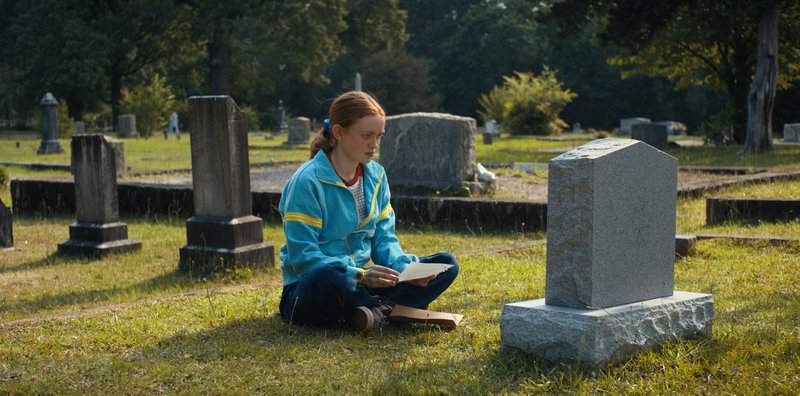
The jam-packed fourth season of Stranger Things was a mixed bag overall, but its high point may also be the high point not just for this batch of episodes but for the entire series to date. It comes in the fourth episode, as Nancy (Natalia Dyer) and Robin (Maya Hawke) learn the history of Vecna (Jamie Campbell Bower) once and for all. The big bad’s origin story is timed perfectly with the ticking clock he’s set for Max (Sadie Sink), who he plans to feed on and crumple up like a juice box.
Like most of Stranger Things’ biggest scenes, this one is actually the length of several scenes in one, but its best part is obvious. There’s a reason Kate Bush’s “Running Up That Hill (A Deal With God)” topped the charts again this year, and it’s not just because it’s a great song. It’s because Stranger Things uses it about as well as any show has ever employed a needle drop during a heart-pounding scene, accompanying Max’s fight for her life and the montage of happy memories that help her face down Vecna and choose to carry on despite the survivor’s guilt that’s led her to the darkest point of her young life.
The fourth season of Stranger Things may have more crowd-pleasing moments, like Eddie’s (Joseph Quinn) guitar solo, and more mind-blowing ones, like Vecna’s first kill, but nothing gets to the beating heart of the series quite like the sight of a troubled, brave teen girl fighting – not just for her life, but for a reason to keep living.
7. Sally’s New Lines
Show: Barry
Episode: “Starting Now”
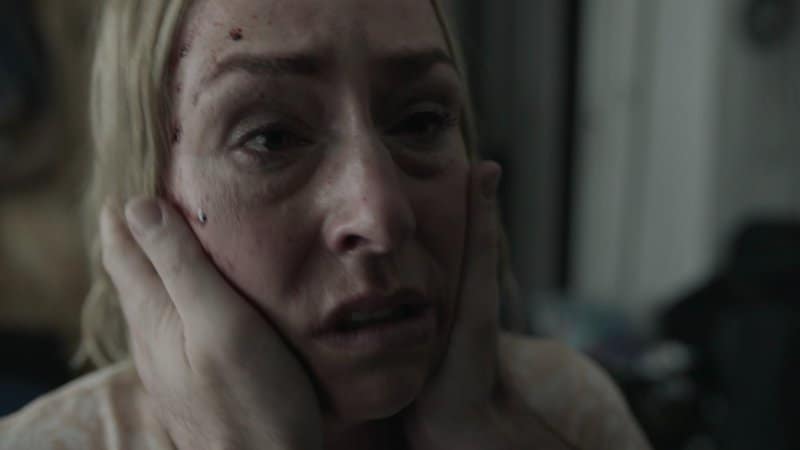
Barry is one of the most consistently gutsy shows on TV, and it continued its hot streak this year with a season that constantly tested the limits of viewers’ inexplicable love for the actor-hitman at its center. Along the way, the season made more room than ever for previously supporting characters, like Sarah Goldberg’s abuse survivor turned actor-filmmaker Sally. Goldberg steps up, imbuing Sally with more depth and emotion than ever before, then caps off the season with a truly showstopping scene.
In “Starting Now,” Sally and Barry (Bill Hader) sit in Barry’s room, plotting against Natalie when a furious motocross gang member suddenly appears. Every shot in this sequence is surprising and smart, from the quick, silent reveal of the man in the doorway behind Barry to the quick pan to Sally after he knocks Barry out cold. At first, it looks like this might be the end for Sally, as the man holds her down and strangles her with excruciating slowness as she bats useless hands against him. But when she gets the upper hand, jabbing him in the neck with a knife, Sally goes feral.
In another great shot, she follows the man into a soundproof podcasting studio and beats him to death with a bat. We hear her first scream – years of pent-up fury at her own abuser, coming back – but then all is silent as his blood splatters against the studio glass. When Barry reaches her, it’s with a level of assurance he hasn’t displayed in a long time. “I did this,” he says to her again and again while she shakes. “Say, ‘Barry did this.’” They’ve come a long way from the stage they started on, but these might be the most important lines Sally ever has to learn.
6. The Meta-Confession
Show: The Rehearsal
Episode: “Orange Juice, No Pulp”
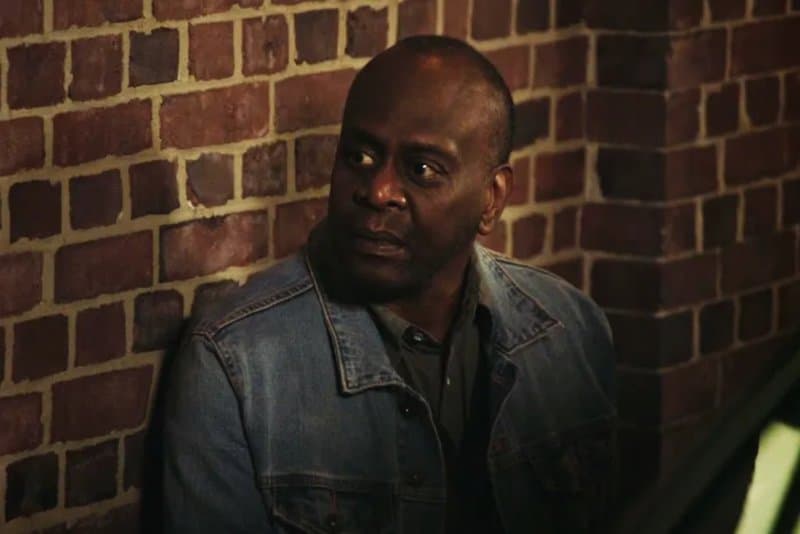
Nathan Fielder’s trippy, neo-meta experiment is ultimately even more than the sum of its parts, but its parts are also downright excellent. The six-episode first season of the series about “rehearsing” real life starts with an episode that gives viewers a false sense of security, setting up a basic structure that the show immediately abandons in favor of increasingly labyrinthine constructions. The bulk of the episode sees Fielder (or “Fielder”) helping a man named Kor practice confessing a secret to a friend and trivia partner, but it ends with Fielder himself failing to confess to Kor.
Early on, we learn via hilarious montage that Fielder has stealthily been planting trivia question answers in Kor’s head over the course of several days. In the episode’s last moments, when Kor celebrates his trivia night win, Fielder imagines confessing that he helped him cheat to K. Todd Freeman, an actor who plays a rehearsal version of Kor, only to be met with scorn. How insensitive for Fielder to meddle with people’s lives on TV, Freeman-as-Kor says, but it’s really Fielder writing his own worst-case scenario, getting ahead of inevitable criticisms about the series itself in the process.
Back in reality (or “reality”), he backpedals, instead telling Kor he’s a great guy. As the scene fades out, Gene Wilder’s “Pure Imagination” begins to play, reminding us of another character who was part empathetic genius, part manipulative madman. Its a moment that hints at the show’s core truth: The Rehearsal ultimately turns out to be not just about “rehearsing” but about the social disconnect and fear of rejection that drives Fielder (or his quasi-fictional counterpart) to yearn for that level of control in the first place.
5. Ancestors
Show: Reservation Dogs
Episode: “Offerings”
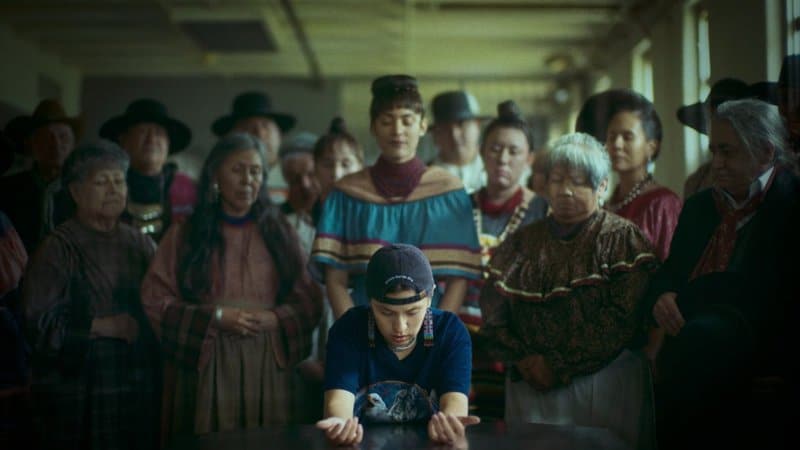
“It’s like everyone’s walking around in the sunshine, and then we’re just in the darkness.” Willie Jack (Paulina Alexis) tells her auntie Hokti (Lily Gladstone) when she comes to her for advice in a prison visitor’s room. Hokti is a medicine woman, but she feels disconnected from the spirits. Her son, Daniel, committed suicide before Reservation Dogs started, and it’s the pain of his loss that’s also driven Willie Jack’s friends apart and into that darkness.
Sterlin Harjo and Taika Waititi’s FX series takes some bold chances in its second season, the bravest of which is letting the aimless feeling of loss permeate the soul of the show. It’s there in the meeting room, too, until Hokti quiets it by speaking a prayer to Willie Jack’s ancestors. As she speaks in a reassuring voice, generations of medicine people appear behind Willie Jack, and she feels their presence like a hand on her shoulder. These are, Hokti says, “the healers who carried us and buried us as we marched.”
The Rez Dogs aren’t permanently healed by this moment, but it’s powerful nonetheless. In the context of the series, it’s a balm to the broken souls of the kids who bear too much. In the context of television as a whole, it’s an authentic version of the type of moment white writers and actors have mimicked on screen for years, using sacred Indigenous spirituality as a stereotype without ever getting to the heart of any real lived experience. This scene of Reservation Dogs is the antithesis of the whitewashed version of Native life we see all too often. It’s an understated and beautiful moment of honoring one’s ancestors, anchored by two raw, fantastic performances.
4. The Chain
Show: Our Flag Means Death
Episode: “We Gull Way Back”
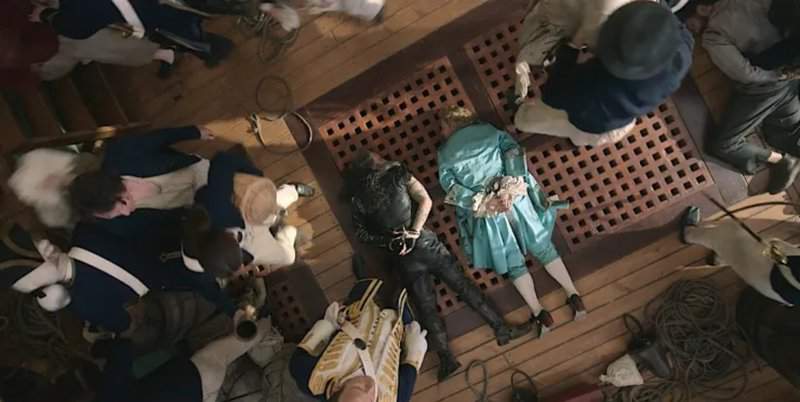
It was the foot touch that launched a thousand fan blogs. HBO’s pirate comedy Our Flag Means Death had already commandeered the hearts of plenty of viewers this spring by the time it reached its eighth episode, but the show’s fanbase seemed to double overnight in the wake of “We Gull Way Back.” There’s a good reason for that: the episode about Blackbeard’s (Taika Waititi) messy history with fellow pirate Calico Jack (Will Arnett) ended with the dread pirate in a boat headed in the wrong direction while his bestie and secret crush Stede (Rhys Darby) ended up under attack from British forces.
Ed soon swims back to the Revenge, where he tells the crew to raise the white flag of surrender. As they do, we hear one of the most welcome sounds in the world: the opening notes of Fleetwood Mac’s “The Chain.” The classic tune is played over a scene that feels like a classic in the making, as the crew of the Revenge are wrestled to the ground and captured by the invading forces in cinematic slow-motion. In the midst of all the chaos, Stede and Ed end up face-down on the deck, handcuffed, but they’re more preoccupied with each other. “You came back,” Stede says, Darby perfectly conveying his surprise and tentative hope. “Never left,” Ed answers with a devastatingly cool wink. As the camera zooms out, it catches a subtle but crucial moment of contact between the pair of previously repressed pirates as they each inch a boot toward one another in the cutest, weirdest game of footsie ever.
3. Burn It Down
Show: Severance
Episode: “Defiant Jazz”
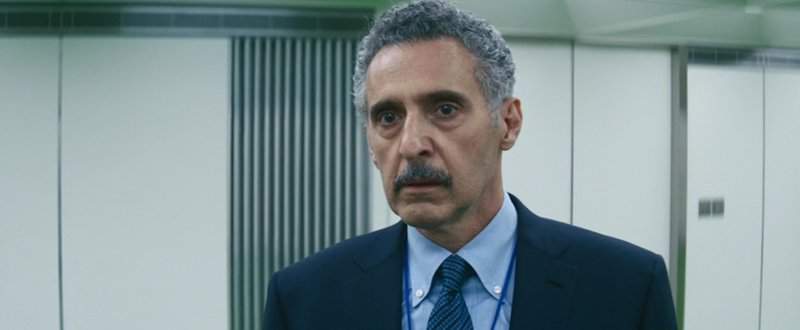
Severance is the best new show of 2022, and the number of scenes in its nine-episode first season that inspire sheer, jaw-dropping awe is in the double digits. If only one moment in the season could get top honors this year, though, it’s the one that catapults the season into its climactic endgame, a simple but powerful moment anchored by John Turturro’s phenomenal performance.
Turturro’s Irving, one of a group of people whose consciousnesses are severed by the shady corporation they work for, spends the majority of the sci-fi series’ first season as a company yes man. As an “innie” whose only memories are of work, he has an almost religious reverence for Lumon and its labyrinthine mythology. As the series unfolds, Irving’s colleagues all open their eyes to Lumon’s sinister nature, but Irving only has eyes for his coworker Burt (Christopher Walken).
It’s at Burt’s retirement party that Irving finally finds his nerve, lambasting supervisor Milchick (Tramell Tillman) with an impassioned description of what’s at stake. “You will walk out of here with your memories. You carry them home with you every night,” he admonishes. “No one can rip them away from you, snuff them out like they never existed. Like you never existed.” He calms down enough to see Burt off with a warm handshake set to Paul Anka’s “Times of Your Life,” but as Milchick walks him back to his own department, we see Irving undergo a subtle but vital change. His coworkers see it too, standing to meet him as he returns, and without any preamble, he delivers one of the most heartfelt, cheer-worthy lines of the year: “Let’s burn this place to the ground.”
2. Up On The Table
Show: Station Eleven
Episode: “Unbroken Circle”
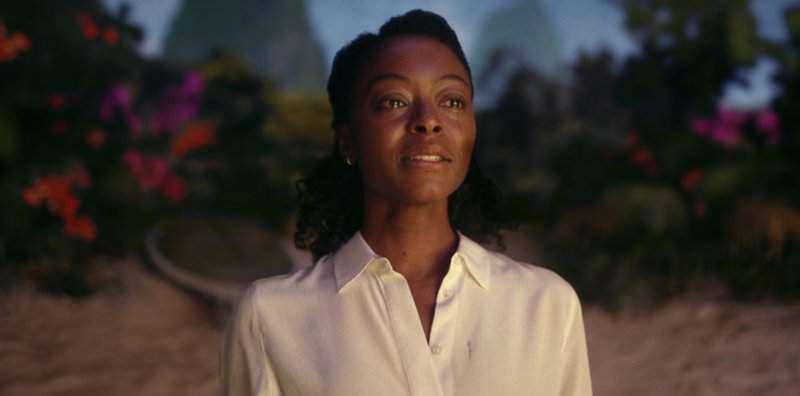
The HBO adaptation of Emily St. John Mandel’s post-apocalyptic novel is kaleidoscopic and strange, but it’s also among the most touching and life-affirming shows I’ve ever seen. The best moment in the three episodes of the series that aired this January is no doubt a long-awaited character reunion that comes in the finale, but that bit of catharsis wouldn’t be possible without the scene that comes directly before it.
In the last piece of the show’s non-chronological puzzle, we see Miranda (Danielle Deadwyler), the author of the graphic novel Station Eleven, patching a call through to a plane outside of the Severn City Airport on the day the world went to shit. It’s a flight full of what she realizes are infected passengers, and in a moment that’s devastating on multiple levels, deathly ill Miranda uses her last moments to convince the pilot not to let the passengers off the plane. “Let the dead be gone,” she pleads with him before telling the story of the hurricane that took her family’s lives when she was a kid. At the same time, her story comes to life with an astronaut guiding her from her hotel quarantine.
“I was coloring up on the countertop, so I survived,” she tells the pilot before explaining that the people in the airport are on the countertop now. Station Eleven is a beautiful jumble of feelings and fates, but no moment from the show connects all its jagged, perfect pieces quite like this one. It’s like seeing the solution to a whodunnit, but the question is one that’s bigger than any of us have the words for. We know now why Miranda wrote the book that guided the series’ characters, and we know why they all lived long enough to read it. Deadwyler carries us through the heart-shattering moment with clear-eyed strength and goosebump-inducing determination.
1. Smoke Break
Show: Better Call Saul
Episode: “Saul Gone”
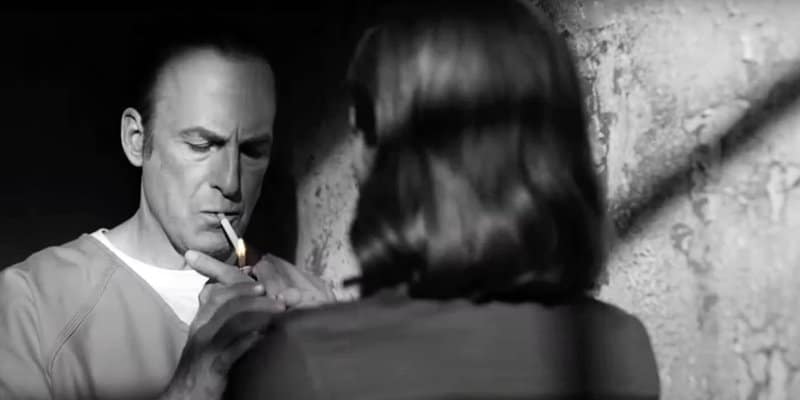
Better Call Saul was originally touted as the story of one transformation, but it ended up becoming the story of many. In its last season alone, Vince Gilligan and Peter Gould’s masterful series switched from a criminal comedy of errors to a high-octane thriller to a full-blown tragedy. Then, it somehow picked up all the pieces of Jimmy McGill’s (Bob Odenkirk) life at the last moment, putting him back together with sturdier stuff than ever before, thanks to the love of his better half, Kim (Rhea Seehorn). He was transformed not just from Jimmy to Saul but, miraculously, back again.
The show’s best scene may be its last. After the events of Breaking Bad, Jimmy ends up in prison, having confessed to a litany of offenses in one last grand courtroom scene meant to earn Kim’s forgiveness and clear his own conscience. It turns out it worked well enough to get her to the prison where he’s incarcerated with an 86-year sentence, as the show winds down with Kim visiting the inmate for a smoke break that matches their first-ever scene together. It’s clear from the moment they meet that there’s still something between them, and when she hands him a lit cigarette, its hopeful red-orange glow offsets the shadow-carved black-and-white of the prison.
What Jimmy and Kim say here doesn’t matter so much as the feeling the scene gives, which is one of reconciliation, companionship, and the kind of complicated love that can’t be stamped out as easily as a cigarette. They’re perfectly matched, both better and worse than they ever expected. When Kim leaves, Jimmy hits her with his finger guns, and the camera cuts to black before we can see if she turns back one more time. Still, this is a happier ending than Better Call Saul fans ever expected, shot through with a genuinely moving sense of redemption and romance. It’s a more-than-satisfying goodbye to what may be the best TV prequel of all time.
Related Topics: 2022 Rewind

Recommended Reading





